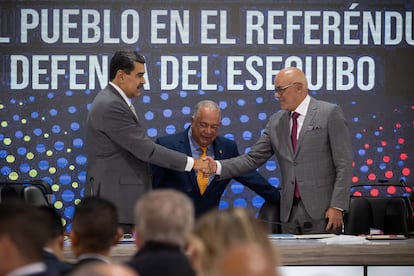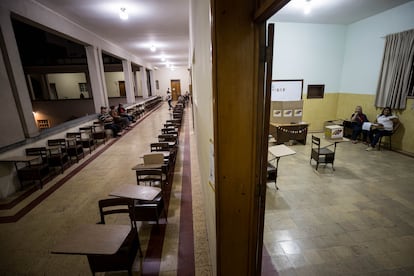With its referendum on Essequibo, Venezuela’s government opens a new front to ensure absolute control until the 2024 presidential elections
A scenario of intensifying conflict with Guyana over the contested area opens the door to declaring a state of emergency that would allow Nicolás Maduro’s government to postpone the 2024 vote


On Sunday, amid deserted polling stations and the electorate’s indifference, Venezuela’s Chavista government declared victory in its referendum on the country’s dispute with Guyana over the Essequibo region. President Nicolás Maduro asserted that the country is beginning a new phase. “We are going to recover and do justice with strength from everyone,” the president said on Monday as he received the results from the president of the National Electoral Council (CNE), Elvis Amoroso. The results of the referendum had changed by a few thousand votes compared to the ones announced on Sunday night. Maduro has said that the referendum is binding, although it was not called as such; it remains to be seen how he will move toward fulfilling the referendum’s proposal.
Beyond the numbers, the Venezuelan government seeks popular support for disregarding the jurisdiction of the International Court of Justice (ICJ), where Guyana is defending its claim to the region. But in a decision prior to the referendum, Venezuela’s Supreme Court had already ruled that it would not abide by international decisions or rulings about its territory. It is not clear whether Venezuela would completely abandon defending its case at the ICJ, which would further isolate the country, or whether it will continue to attend the hearings and present its counterargument in April 2024 in a legal case that is still far from being resolved.
Following the results of the referendum, the main question is how it will enforce the statements in the fifth question, which has raised the most concern in the country. In a ruling on Friday, the ICJ warned Venezuela not to do anything that would modify the status of the territory, which is de facto administered by Guyana, while the border dispute is being decided. On Sunday, Venezuelans voted to approve the government’s creation of the state of Guayana Esequiba and the execution of “an accelerated plan for integral attention to the current and future population of that territory, including, among other things, granting Venezuelan citizenship and identity cards.” In some quarters, this move has been interpreted as a threat to annex a territory where around 125,000 mostly English-speaking people with Guyanese citizenship live. “We do not know if Venezuela is going to limit itself to symbolic gestures with the creation of the Essequibo territory and appointing symbolic authorities, which Guyana might see as an aggression, or if they intend to use some mechanism by force,” says lawyer Alí Daniels.
Such a pretense could lead Guyana to bring the conflict to the U.N. Security Council and even pave the way for a new lawsuit against Venezuela at the International Criminal Court, where it is already being investigated for crimes against humanity, Daniels warns. “A conflict situation does not require warlike activity. It could be the mobilization of ships, an expression of territorial control of waters, which could be considered an [act of] aggression and spark an escalation that no one wants.” Guyana has granted oil concessions in the coastal waters of the disputed territory. In 2018, the Venezuelan Navy intercepted an ExxonMobil vessel sailing in the disputed waters, which increased diplomatic tensions at the time.
Internationally, Venezuela has a very short leash with Guyana. The latter not only has the support of the United States and the United Kingdom, but also from the Caribbean Community (CARICOM), Cuba and China; while the latter are Venezuela’s allies in other areas, they have historically supported Guyana in this territorial conflict.

The Chavista government is waging a new battle that has less to do with sovereignty and international geopolitics than it does with its domestic position ahead of Venezuela’s presidential elections a year from now. According to pollsters like Delphos, Maduro has not been able to improve on his floor of 15% popular support, prolonging his administration’s worst moment. The elections should be held in the second semester of 2024, according to the Barbados agreements, where the international community is pressuring Maduro to comply with minimum democratic guarantees. The elections now represent the greatest threat to his government’s stability and ability to remain in power. Therefore, as several analysts have argued, a conflict would serve as a pretext for the Venezuelan government to declare a state of emergency and postpone the elections. “This is more a matter of domestic politics than [international] politics, because in six months there will not be a decision from the International Court of Justice on the Essequibo issue, but there will be elections [in Venezuela]. In view of the referendum’s failure, they can use it for purposes other than a defense of sovereignty,” Daniels adds.
This referendum has also tested the new CNE authorities, which were changed in an untimely fashion in August, sacrificing the body’s most diverse configuration in a long time, achieved as a result of the Barbados negotiations. In an initial report on Sunday night, these authorities spoke of an “overwhelming victory” with 10.5 million votes that would increase because they said that Venezuelans were still voting after 10 p.m. Hours later, in statements made by Amoroso, the same authorities clarified that 10,431,907 Venezuelans voted, a difference that has fueled the opposition’s distrust of the credibility of the institution that is now responsible for organizing the 2024 presidential elections. That discrepancy also flies in the face of the ruling party’s history: it has never obtained more than 10 million votes. In this case, the referendum did not produce the anticipated snapshot of lines of people at the polling stations to contrast with last month’s opposition primary elections, in which the mobilization of 2.4 million people surprised the organizers themselves and upset the ruling party.
In 2018, Maduro was reelected with 6 million votes in an early election in which the main opposition candidates were disqualified. The international community did not recognize these elections, the cause of the long institutional conflict that Venezuela has been experiencing in recent years. The disaggregated votes of the referendum on the Essequibo region have not been disclosed. Similarly, the vote tally was not released in the 2017 National Constituent Assembly elections that created a parliament parallel to the one the opposition had conquered; the ruling party essentially participated alone in that process.
The lack of data on the abstention rate also raises questions. On the night of the results, opposition leader and former presidential candidate Henrique Capriles Radonski also questioned the figure that Amoroso gave and said that 2.1 million voters had participated. “He did not dare to say that (…) it was 5 votes per voter,” he wrote. That would be how the first 10.5 million votes reported by Venezuela’s electoral authorities could make sense.
Sign up for our weekly newsletter to get more English-language news coverage from EL PAÍS USA Edition
Tu suscripción se está usando en otro dispositivo
¿Quieres añadir otro usuario a tu suscripción?
Si continúas leyendo en este dispositivo, no se podrá leer en el otro.
FlechaTu suscripción se está usando en otro dispositivo y solo puedes acceder a EL PAÍS desde un dispositivo a la vez.
Si quieres compartir tu cuenta, cambia tu suscripción a la modalidad Premium, así podrás añadir otro usuario. Cada uno accederá con su propia cuenta de email, lo que os permitirá personalizar vuestra experiencia en EL PAÍS.
¿Tienes una suscripción de empresa? Accede aquí para contratar más cuentas.
En el caso de no saber quién está usando tu cuenta, te recomendamos cambiar tu contraseña aquí.
Si decides continuar compartiendo tu cuenta, este mensaje se mostrará en tu dispositivo y en el de la otra persona que está usando tu cuenta de forma indefinida, afectando a tu experiencia de lectura. Puedes consultar aquí los términos y condiciones de la suscripción digital.








































